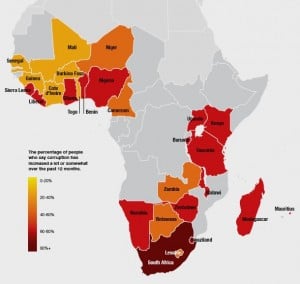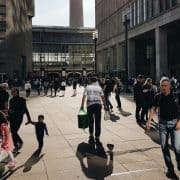|
Getting your Trinity Audio player ready...
|
Global corruption watchdog Transparency International (TI) today launches its African edition of the Global Corruption Barometer, which was conducted in partnership with Afrobarometer. The report, titled People and Corruption: Africa Survey 2015, polled 43 143 respondents across 28 countries in sub-Saharan Africa on their experiences and perceptions of corruption in their country, and the results are, some would say, predictable.
More than half of Africans (58%) said that corruption has increased over the past year, while 14% think that it has stayed the same and only 22% think that it has decreased. Not a single government received a good rating by a clear majority of its citizens in terms of its anti-corruption efforts. On the contrary, said TI, a large majority believed that 18 out of 28 governments are fully failing in their duty to stop the abuse of power, bribery and secret deals.
South Africa is one of three countries – the other two are Ghana and Nigeria – where people were most likely to say that they think corruption has risen in the 12 months prior to the survey period. In these countries three-quarters or more of respondents said corruption has increased either somewhat or a lot.
More than four out of five South African citizens (83%) say they have seen a rise in corruption and in fact, the country was the worst performer on this question. In addition, most South Africans, 79%, thought their government was doing a bad job in tackling corruption, while only 20% had the opposite view.
Corruption Watch executive director David Lewis commented: “The survey was conducted over the period [March 2014 to September 2015] in which the respondents witnessed government’s response to the Public Protector’s Nkandla report. We believe that the extraordinarily high number of South Africans who perceive corruption to have increased reflects everyday experience, but principally reflects public judgment on the Nkandla fiasco.”
South Africa ends the year with that issue unresolved and with several major corruption scandals on the boil. Lewis added. “We think particularly of the evolving Prasa matter, as well as growing disquiet surrounding allegations of corruption in the relationship between Neotel and Transnet.”
The three countries which had the smallest proportion of citizens saying corruption has risen were Burkina Faso, Cote D’Ivoire and Mali – less than one-third of respondents answered that corruption has increased in the past 12 months.
Download the survey for more information, results and methodology.
Police still have a bad rep, but business is catching up
The survey asked respondents how much corruption there was in 10 different powerful groups in their country – the political and government elite (the president’s office, members of parliament, government officials), public officials who work at the service level (tax officials, the police, judges and magistrates, local government councillors), and those who are not part of the public sector but who often wield strong influence (business executives, religious leaders and traditional leaders).
Across the region, the police are seen as the most corrupt group – almost half of respondents (47%) said they thought either most or all police officers are corrupt.
The police are followed by business executives, which are seen as the second most corrupt group – 42% said most or all business executives are corrupt.
This is the first time that business executives have made it into the ranks of the most corrupt group.
Government officials and tax officials rank as the third and fourth most corrupt groups (38% and 37% respectively). Judges and magistrates, members of parliament, local government councillors and the office of the presidency all score similarly, while traditional leaders and religious leaders are seen to be the least affected by corruption in the region.
Bribery is rife
According to TI’s estimate, an alarming 75-million people have paid a bribe in the past year – some of those bribes were to escape arrest or punishment, but many were for essential services such as water or electricity, or to obtain official documents such as an ID, or to get attention at a hospital.
Across the region 22% of people who were involved with either public schools, public healthcare, the police, courts, or applying for official documents or for utilities, in the past 12 months admitted that they paid a bribe. When extrapolating the proportion of bribe payers in each of the surveyed countries to their entire adult population, this suggests that nearly 75-million Africans have paid a bribe.
“Unfortunately it is those who are meant to be upholding the law – the police and courts – who seem to be the most likely to be involved in bribery, and those who are the poorest in society who are the most likely to have to pay,” said TI.
The majority of bribepayers (62%) admitted that they have paid bribes multiple times over the past year, either for the same public service or for different services.
People can make a difference
Despite the millions who have paid bribes, just over 50% of the respondents – 56% in South Africa – believed that ordinary people can make a difference in the fight against corruption. However, 38% in general feel disempowered to tackle the scourge.
The most positive views came from Botswana and Madagascar, where 70% or more said that they think that ordinary people can make a difference. On the other hand, the people of Nigeria and Sierra Leone felt the least empowered to help fight corruption in their countries, with less than 40% confident of making a difference.
A quarter of South African respondents believed that the most effective way for ordinary citizens to combat corruption is by reporting their experiences, followed by a further 22% who identified the refusal to pay bribes as an effective means to fight corruption.
Lewis commented: “This is consistent with our experience. In the space of nearly four years we have received thousands of reports of corruption from the public. That South Africans have refused to accept corruption as a way of life is the most encouraging finding of this survey.”
Despite the fact that reporting corruption is seen by citizens across the region as the most effective anti-corruption action, TI said that among those who have actually paid a bribe, only 12% of bribepayers said they reported it. While this is a start, it indicates that much more should be done to encourage people to step forward and report graft when they experience it.









